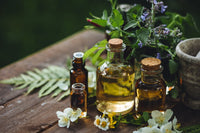It’s a common mystery: you catch a whiff of a friend’s perfume and it smells incredible, but when you try it on yourself, it seems... off. You may wonder if it's the same fragrance or if your bottle has somehow gone bad. It’s not that the fragrance has magically changed or gone bad—the magic lies in your own body. The truth is, the scent is the same—it's the wearer who makes all the difference! Perfume interacts with each person’s unique body chemistry, which is why fragrances can smell so different on different people. Let’s explore the science behind this phenomenon.
Skin Chemistry: The Key Factor
The most important reason fragrances smell different on different people is individual skin chemistry. Skin acts as the surface where fragrance molecules interact, and depending on a variety of factors, that interaction can vary dramatically.
- pH Levels: The pH of your skin is a measure of how acidic or alkaline it is. The typical range for skin pH is slightly acidic, around 4.5 to 5.5. However, variations exist, and these small differences can have a big impact on how your skin interacts with fragrance molecules. For instance, more acidic skin can cause certain notes to smell sharper or more intense, while alkaline skin might make scents appear softer or less pronounced.
- Oil Levels: The natural oils in your skin play a huge role in how a fragrance behaves. Oily skin can hold onto scent molecules for a longer period. This allows the fragrance to last longer and sometimes smell more intense. Dry skin, on the other hand, lacks the oils to hold the fragrance, causing it to evaporate more quickly and possibly making it smell different or disappear faster.
- Body Temperature: Your body heat also affects the volatility of fragrance molecules. Warm skin causes the fragrance to evaporate faster, which means the top notes (the first layer of scent you smell) may disappear quickly, allowing the heart and base notes to emerge sooner. On cooler skin, the scent may unfold more slowly and last longer.
Natural Skin Odor: A Personal Base Note
Every person has a unique natural odor, created by a combination of factors such as genetics, diet, and even the bacteria that live on your skin. This “baseline” scent is present whether or not you’re wearing perfume. When you apply fragrance, the scent mixes with your natural odor, creating a personalized version of the fragrance.
For example, someone who consumes a lot of garlic or spices in their diet may have a more pungent natural odor that can alter the smell of certain fragrance notes. Similarly, the natural bacteria on your skin, which break down sweat and oils, can also affect how perfume smells.
Hormones and Metabolism
Hormones play a big role in how your body interacts with fragrance. Factors such as menstruation, pregnancy, and menopause can all change your skin’s chemistry. Higher levels of estrogen, for example, can make your skin more acidic, potentially affecting how the fragrance smells. Conversely, hormonal imbalances may alter the way your skin retains scent molecules.
If you have a fast metabolism, your body tends to be warmer because it burns more energy. This higher body temperature can cause perfume to evaporate more quickly, which may change the way the scent develops over time. In contrast, someone with a slower metabolism may find that their fragrance lasts longer but develops more gradually.
Skincare Products and Fragrance Interaction
What you apply to your skin before your perfume can dramatically change the way it smells, too. Moisturizers, body oils, and even sunscreen create a barrier on the skin that can trap fragrance molecules, allowing the scent to last longer. In some cases, certain skincare products can also enhance or mute specific notes. For example, a rich, unscented body lotion can help extend the life of a perfume, while a fragranced lotion may blend with the scent in unpredictable ways.
Even your body wash, laundry detergent, or fabric softener can sometimes interact with perfume. If these products have a strong scent, they can mix with your perfume and change its overall profile. If you notice a fragrance smells off or overpowering, it could be due to the scent of your soap or lotion.
Location, Location, Location
Where you are when wearing a fragrance also matters.
Temperature and humidity can affect how a fragrance performs. In hot, humid climates, scents tend to be stronger because the moisture in the air enhances the fragrance molecules, making them more noticeable. Conversely, cold or dry environments can make a perfume fade faster because the lack of moisture causes the scent to dissipate more quickly.
Additionally, factors such as pollution, cigarette smoke, or even indoor air conditioning can affect how a fragrance is perceived. These elements can either intensify certain notes or cause them to dull, depending on the environment.
Perfume Composition
Not all perfumes are created equal, and the ingredients in a fragrance will react differently depending on the wearer’s body chemistry.
Perfumes are structured with three layers of notes: top (initial burst), middle (heart), and base (long-lasting). Depending on your skin type and temperature, certain notes might stand out more than others. For instance, someone with oily skin might find that the heart notes dominate, while someone with dry skin might experience the base notes more strongly.
Some fragrance molecules are more volatile (evaporate quickly) than others. Citrus notes, for example, are very light and evaporate faster, which means they may not last as long on warm skin. In contrast, heavier notes like woods or musks tend to last longer and are more stable, but can still be influenced by skin chemistry and environmental factors.
Fragrance is Personal
Fragrance is a highly personal experience, influenced by your unique skin chemistry, hormones, environment, and the products you use. No two people will smell exactly the same, even when wearing the same perfume.
When buying a new fragrance, always test it on your own skin first. What smells perfect on a friend may not react the same way with your skin, and that’s what makes fragrance such a personal journey.








